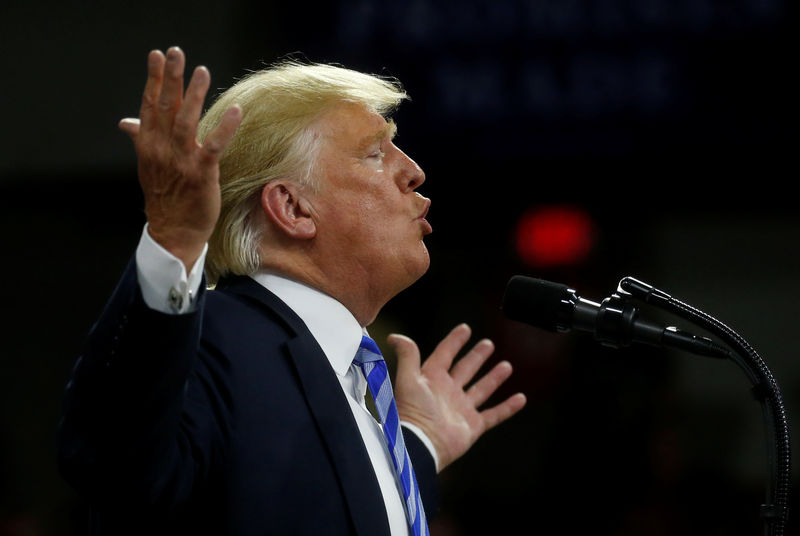(Bloomberg) -- President Donald Trump has tried to blame the Federal Reserve for a slowing U.S. economy, but it turns out that voters may pin the blame on him.
A Bloomberg survey conducted with YouGov showed 28% of American adults believe the president in general is most responsible for the economy. That surpasses the 20% of respondents who say Congress is most responsible and the 17% who assign responsibility to the central bank. The margin of error is plus or minus 3 percentage points.
Trump, who’s up for re-election next year, has repeatedly attacked the U.S. central bank and its head Jerome Powell, accusing the Fed of stifling economic growth by keeping interest rates too high. Despite his attempts to shift blame to the Fed, the poll suggests about twice as many Americans still see the president as most responsible for the nation’s economic well-being.
Over the past two years, Trump has tied himself closely to the economy, said Gregory Daco, chief U.S. economist at Oxford Economics.
“He’s trying to shift the paradigm to be, ‘The economy’s good because of him and the economy’s bad because of somebody else,’ but I’m not sure that will work in people’s psyche,” Daco said.
U.S. economic growth cooled in the second quarter to a 2% annualized pace, and analysts expect slower gains in the second half, putting Trump’s 3% goal out of reach. Economists see higher chances of an imminent recession than they did a year ago.
The survey asked 1,262 adults, “In your opinion, who is most responsible for the economy?” Options included the president, Congress, the Federal Reserve, “none of these,” and “don’t know.” The survey was conducted Sept. 6-9.
Who is truly responsible for the economy can be a matter of debate. The president and lawmakers can set parameters for growth through taxes, fiscal policy and regulation. At the same time, the Fed -- whose chairman and board members are appointed by the president and confirmed by the Senate -- has a powerful tool in short-term interest rates to manage swings in the economy.
Through tweets, speeches and press releases, Trump has emphasized his role in stock-market gains, low unemployment and economic growth. Yet as odds of recession have grown, the president has tried to distance himself from more negative data by blaming the Fed. And for good reason: In the last century, the only elected presidents who lost re-election did so after overseeing a recession.
Because of how vociferous Trump has been about what the Fed should and shouldn’t do, there may be “a feeling that relative to past presidents, he’s doing a lot more trying to manage the economy,” said Jim Paulsen, chief investment strategist at the Leuthold Group. That’s seemingly in contradiction with the intention of Trump’s tweets.
Trade Policy
At the same time, one of the biggest threats to the economic outlook is U.S.-China trade policy. A trade war with China -- and the tariffs and uncertainty that come along with it -- have weighed on American companies, especially those in the manufacturing sector.
By announcing new rounds of tariffs and policy updates through Twitter, Trump further associates himself with the economic policies that may be most hurting the expansion despite intentions to protect American businesses and the economy from what the administration calls one-sided trade deals.
Expansions typically end because of a policy mistake by Congress, the president or the Fed, and right now, “if you’re looking around for culprits, I would say what a lot of us would point to is trade policy,” said Carl Tannenbaum, chief economist at Northern Trust Corp (NASDAQ:NTRS).
Dividing data among different groups, Republicans (35%) were more likely to assign responsibility of the economy to the president than Democrats (30%).
When breaking down the results by education, those with less than a four-year degree were in line with the national trend in placing responsibility with the president but also had a significantly greater number of respondents say “Don’t know.” Those with four-year and post-graduate degrees had the highest levels of attributing responsibility to the Fed or “None of these.”
The breakdown did vary significantly by age group. A third of baby boomers, those born 1946-1964, saw the president as the most responsible, while less than a fourth of millennials (1982-1999) and Generation X individuals (1965-1981) felt the same. Generation X was split almost equally between the president and the Fed at 23% and 22% respectively.
Part of this may stem from how involved the Fed was in various downturns and recoveries over time.
“The generation that lived through the Great Moderation believe much more in the Fed than generations on either side,” Daco said.
After taking office in 1979, then-Fed Chairman Paul Volcker boosted interest rates to historical highs in an attempt to get inflation under control. While the move ultimately drove the economy into a recession, it’s possible many adults associate the Fed with the long economic expansions of the 1980s and 1990s that followed -- a period known as the “Great Moderation.”
For younger Americans, memories of the massive fiscal stimulus provided in the last recession -- paired with historically-low interest rates -- might have tempered millennials’ views of just how much the Fed can do for the economy.
“I do think that because of quantitative easing, and because of negative yields in the world, there has developed a sense that the Federal Reserve is spent,” Paulsen said. If that’s part of the American mindset, “then really what matters is just what the president’s going to do.”
